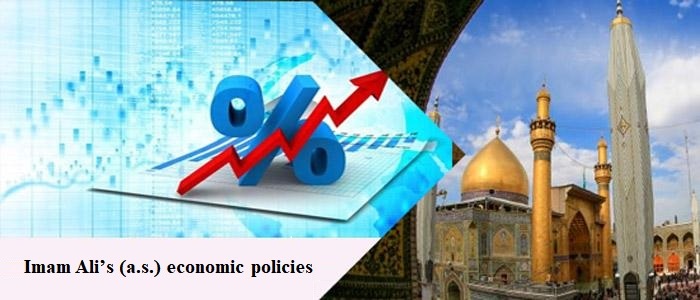AhlulBayt News Agency (ABNA): Economy and business have a special place in the Imam Ali (a.s.) teachings. Following the tradition of the Holy Prophet (p.b.u.h), Imam Ali (a.s.) encouraged people to do business, so much so that he said, “Do business; may God bless you. Indeed, I heard the Messenger of God (p.b.u.h) that said, “Sustenance has ten parts, nine of which are in business, and one in other occupations”.”
One of the general principles in the economic planning of Imam Ali (a.s.) was to pay attention to developing the country and to prosper the businesses. Because “all people use and pay taxes. Your thoughts on prospering the land should be more than your plan to collect taxes. Because taxes can only be obtained by prospering the land; and whoever wants to collect taxes without prospering the land, will destroy the cities, make God’s servants suffer, and his rule will not last long except for a short time.”
He (a.s.) further said, “Because whatever you burden on the prosperous country, it will endure. The reason that a land is not prosperous, is the poverty of its people; and their poverty and deprivation are the result of the wealth hoarding of the governors; their suspicion of the sustenance of the government; and their lack of use of lessons and advice.” (1)
Officials and agents of every government have loved ones and relatives, some of whom seek to use the country’s facilities and benefit and enjoy people’s property.
Imam Ali (a.s.) warned his agents to avoid such dangerous people, as he said, “The governors have relatives (and acquaintances) who are selfish and greedy for people’s assets and are not fair in trade. Separate them and cut off their roots. Don’t give any land from Muslims’ properties to any of your relatives and friends.” (2)
In economic planning, security is an important factor without which economic prosperity is impossible. The meaning of such security is the way the government interacts with merchants, businesses, producers, and workers, and government planning should be in line with their job security. (3)
“Advocates and representatives of the nation!! You are their leaders. Do not offend anyone because of his need, and do not forbid him from what he wants.”
“Do not sell the life necessities of a taxpayer, such as winter and summer clothes, and his castles and slaves that are his means of work. Do not whip people to get a dirham (taxes).”
“Do not touch the property of any person, whether a Muslim who is praying or a non-Muslim who is under the protection of Islam, except for horses and weapons that are used against Islam. Because it is not proper for a Muslim to leave horses and weapons in the hands of the enemies of Islam, to cause the glory of the enemies to be against the Muslims.” (4)
“Act upon the piety of God, who is unique and has no partner; do not frighten a Muslim, do not cross him without his consent, and do not take from him more than what God has determined in his property.” (5)
Sources:
1. Nahj al-Balagha, Letter 53
2. The same
3. Nahj al-Balagha, Letters 51 and 25
4. Nahj al-Balagha, letter 51
5. Nahj al-Balagha, letter 25
6. “The Manifestation of Imamate: An Analysis of the Government of Imam Ali (a.s.)”, by Sayed Asghar Nazemzadeh Qomi. Al-Hadi Publication, 1372, (pp. 358-369.)
**************
End/ 345

